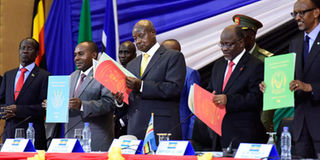South Sudan to boost EAC market

L-R: South Sudan vice president James Wani Igga, Burundi 2nd vice president Dr Joseph Butore, Uganda’s Yoweri Museveni, Tanzania’s John Pombe Magufuli and Rwanda’s Paul Kagame display dummies of the e-copy of the East African passport during the 17th Summit of the EAC on Wednesday. PHOTO BY PPU
What you need to know:
Pulling strings. The world’s youngest nation was admitted to the regional bloc early this week
Kampala.
Going by the saying that big is better, the admission of South Sudan the East African Community (EAC), is destined to enhance trade within the region, experts say.
The world’s youngest nation was admitted to EAC at the 17th summit held in Arusha, Tanzania on March 2. The summit was attended by four regional presidents, including Uganda’s Yoweri Museveni, Kenya’s Uhuru Kenyatta, Tanzania’s John Magufuli and Rwanda’s Paul Kagame.
The admission makes South Sudan the sixth nation of the EAC bloc thus creating a common market of about 162 million people.
Commenting yesterday about South Sudan’s admission to the community, Amb James Mugume, the Permanent Secretary in the Ministry of Foreign Affairs in Kampala, said: “…South Sudan comes with a bigger market, bigger investment and bigger tourism into the region.”
Amb Mugume, however, said there are some legal steps and procedures that South Sudan has to work on that will help them build the capacity to meet some of the obligations within the treaty.
“…the challenge for the rest of the member states is to make sure that South Sudan complies with the all the legal procedures within the next 12 months,” he noted.
Some of the legalities that South Sudan has to address include matters to do with standards, customs union, monetary union, and common market requirements.
Trade
Already, trade between South Sudan other member states like Uganda and Kenya, who stand to benefit in the country’s admission, has been going on well. Currently Uganda and Kenya’s annual exports to South Sudan are valued at more than $200 million (Shs504 billion) and $180 million (Shs453.6 billion) respectively.
Mr Stephen Kaboyo, the managing partner at Alpha Capital, a forex trading firm, said: “One of the primary advantages (of South Sudan’s admission) is opening access to greater size of the market - a larger export market for the member states. This will trigger faster and higher investments and it will increase the bargaining power of the EAC members and create greater economic leverage.”
Greater competition
Mr Kaboyo said more to this, EAC consumers will benefit from greater competition in product markets.
According to Mr Gideon Badagawa, the executive director Private Sector Foundation Uganda (Psfu), the joint investment in the oil and gas sector will help the development of the region’s oil resource.
Mr Badagawa adds that South Sudan, which is already into oil production, comes with a wealth of experience and through joint investments with fellow member states, will help Uganda and Kenya produce their oil.
Peace and security
Aly Khan Satchu, a Nairobi-based equity markets analyst with focus on East Africa, said: “The self-harm civil war caused the South Sudan economy [now hopefully ended] an equivalent of going back to ground zero.
Mr Badagawa said South Sudan’s challenge is that they must work to quickly fix security, legal processes including contractual engagements and build institutions.
“We have had a lot of business with South Sudan and we only stand to benefit especially if trade and investment is assured of peace and security,” Mr Badagawa noted.
On peace in the region, Amb Mugume said it is now the responsibility of all the member states to put in place security architectures to see that there is total peace in South Sudan.
“It’s up to other member states to come together and take responsibility to help out on the insecurity,” Mugume noted.
Procedure for admission
According to Article 3 of the EAC Treaty, for a country to be admitted to the community, it has to adhere to universally acceptable principles of good governance, democracy, the rule of law, observance of human rights and social justice.
Experts say some of the reasons that qualified South Sudan to join the community is its geographical proximity with potential to link the East African region to north and central Africa.
South Sudan applied to join the East African Community on 10th June 2011.
A Verification Committee from EAC visited the Republic of South Sudan from July 15 to 31, 2012, with the aim of establishing the Republic of South Sudan‘s level of conformity with the Criteria for Admission of Foreign Countries into the East African Community as provided for under Article 3 of the treaty establishing the EAC.
Based on the recommendation of the report by the Committee, the EAC Heads of State Summit in November 2012 directed the Council of Ministers to negotiate the admission of South Sudan putting into consideration the provision of the EAC Treaty on the criteria for joining the Community.
The country also recently established a mechanism for ratification and accession to international treaties, having already acceded to the UN and AU Charters, and has been admitted to several regional and international organisations such as Igad, the Nile Basin Initiative and Unesco.



